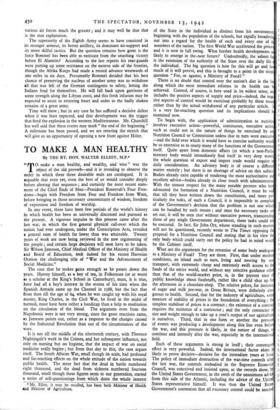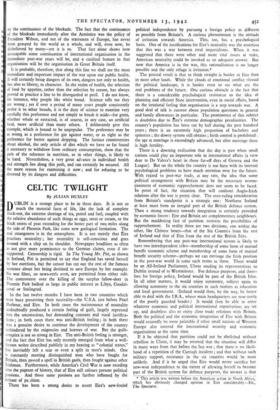TO MAKE A MAN HEALTHY
By THE RT. HON. WALTER ELLIOT, M.P.*
"TO make a man healthy, and wealthy, and wise " was the object of the old proverb—and it is revealing to observe the order in which these three desirable ends are catalogued. It is arguable that even yet, even the best of us would consider deeply before altering that sequence ; and certainly the most recent state- ment of the Chief Ends of Man—President Roosevelt's Four Free- doms—begin with Freedom from Fear and Freedom from Want, before bringing in those necessary concomitants of wisdom, freedom of expression and freedom of worship.
In any event, there have been few periods of the world's history in which health has been so universally discussed and pursued as the present. A vigorous impulse to this process came after the last war, in which the first general physical call-over which the nation had ever undergone, under the Conscription Acts, revealed a general state of health far lower than was attainable. Twenty years of work are now being reviewed in the new regimenting of the people ; and certain large decisions will soon have to be taken. Sir Wilson Jameson, Chief Medical Officer of the Ministry of Health and Board of Education, took indeed for his recent Harveian Oration the challenging title of " War and the Advancement of Social Medicine."
The case that he makes gains strength as he passes down the years. Harvey himself, as a boy of ten, in Folkestone (or at worst as a scholar at the King's School in Canterbury), must, it is true, have had all a boy's interest in the events of his time when the Spanish Armada came up the Channel in 1588, but the fact that from then till the age of 64, when he was caught up with his royal master, King Charles, in the Civil War, he lived in the midst of turmoil, must have been rather a handicap than a help to meditation on the circulation of the blood. The argument even from the Napoleonic wars is not very strong, since the great reactions came, as Jameson points out, rather as a response to the changes caused by the Industrial Revolution than out of the circumstances of the wars.
It is not till the middle of the nineteenth century, with Florence Nightingale's work in the Crimea, and her subsequent influence, not only on nursing but on hygiene, that the impact of war on social medicine really begins ; but from that day to this, the case argues itself. The South African War, small though its scale, had profound and far-reaching effects on the whole attitude of the nation towards public health. The mere fact that the dead in battle numbered eight thousand, and the deed from sickness numbered fourteen thousand, small though these figures seem to our generation, started a series of self-questionings from which dates the whole interest
*Mr, Elliot, it may be recalled, has been both Minister of Health and Minister of Agriculture.
of the State in the individual as distinct from his environmen beginning with the population of the schools, but rapidly broaden. out into a regard for the health of each and every one of members of the nation. The first World War accelerated the proce and it is now in full swing. What further health developments likely to emerge in thc.near future? Undoubtedly, the salient fa is the extension of the authority of the State over the daily life the individual. The big question is how far this will go and h much of it will persist, and this is brought to a point in the sun question " For, or against, a Ministry of Food? "
There is no doubt that control over the nation's diet is the li along which the most immediate reforms in its health can achieved. Control, of course, is here used in its widest sense, includes the positive aspects of supply and price—indeed, the ne live aspects of control would be exercised probably by these mea rather than by the actual withdrawal of any particular article. is a very far-reaching question and its implications should examined now.
To begin with, the application of administration to nutriti involves executive action—powerful, continuous, executive action such as could not in the nature of things be exercised by a Nutrition Council or Commission unless that in turn were executiv. —and the field over which it would have to exercise authority woul, be so extensive as to usurp many of the functions of the Governmer, itself. Quite apart from domestic affairs (in which a non-Parlia mentary body would immediately find itself in very deep wate the whole question of export and import trade would require i daily consideration. An advisory body is of course a differ D. matter entirely ; but there is no shortage of advice on this subjec Bodies already exist capable of tendering the most authoritative a excellent advice—bodies already in close touch with administrati With the utmost respect for the many notable persons who h v. advocated the formation of a Nutrition Council, it must be sai that till they have written down the constitution, and more par titularly the tasks, of such a Council, it is impossible to complai of the Government's decision that the problem is not one whit can be handled by such means ; and once the necessary tasks ar• set out, it will be seen that without executive powers, transcend in those of any single Government department, these tasks could no, be executed. In fact, Sir John Orr, whose standing in such matte will not be questioned, recently wrote to The Times opposing h• proposal for a Nutrition Council and stating that in his view th. only body which could carry out the policy he had in mind wo be the Cabinet itself.
What are the arguments for the retention of some body analogou to a Ministry of Food? They are three. First, that under mode conditions, an island such as ours, living and moving by sea transport, with extremely cheap and extremely swift access to th- foods of the entire world, and without any selective guidance othe than that of the world-market price, is, in the present state of public knowledge about foodstuffs, rather like a child shut up fo the afternoon in a chocolate-shop. The relative prices, for instant of sugar and milk pre-war, in Great Britain, were definitely dan gerous to health. Second, that for the industry of agriculture, soul- measure of stability of prices is the foundation of everything ; th, simplest stabiliser of prices is a contract ; the existence of a contra requires the existence of a contractor ; and the only contractor size and weight enough to take up a year's output of our agricult is ourselves. Third, that in one form or another the pressu • of events was producing a development along this line even befor• the war, and this pressure is likely, in the nature of things, t' continue and intensify after the war, especially in the internatio field.
Each of these arguments is strong in itself ; their converges effect is very powerful. Indeed, the international factor alone i likely to prove decisive—decisive for the immediate years at leas The policy of immediate destruction of the war-time controls t.,, the last war, the controls embodied in the Supreme Economi Council, was conceived and insisted upon, as the records show, the United States Government, in the teeth of the unanimous ad 'i from this side of the Atlantic, including the advice of the Unit' States representative himself. It was then the United S t- Government's contention that all recessary control could be secur
• II I
by the continuance of the blockade. The fact that the continuance of the blockade immediately after the Armistice was the policy of President Wilson, and not of the statesmen of Europe, has never been grasped by the world as a whole, and will, even now, be disbelieved by many—yet it is so. That fact alone shows how inescapable some continuation of international organisation in the immediate post-war years will be, and a cardinal feature in that organisation will be the organisation in Great Britain itself.
It is probable, therefore, that along this line we shall see the most immediate and- important impact of the war upon our public health. It will certainly bring dangers of its own, dangers not only to health, but also to liberty, to character. In the realm of health, the selection of food by appetite, rather than the selection by reason, has always proved in practice a line to be disregarded at peril. I do not know, for instance, why people like white bread. Science tells me they are wrong ; yet if over a period of many years people consistently prefer it to other breads, it is the duty of science to examine very carefully this preference and not simply to brush it aside—for grain, whether whole or extracted, is of course, in any case, an artificial food, more artificial than many others. I deliberately give this example, which is bound to be unpopular. The preference may be as wrong as a preference for gin against water, or as right as the preference for butter against dripping. The furious controversies about alcohol, the only article of diet which we have so far found it necessary to withdraw from ordinary consumption, show that the path of the reformer in nutrition, as in other things, is likely to be hard. Nevertheless, a very great advance in individual health and strength lies along this path, and can certainly be secured. All the more reason for examining it now ; and for refusing to be deterred by its dangers and difficulties.



























 Previous page
Previous page